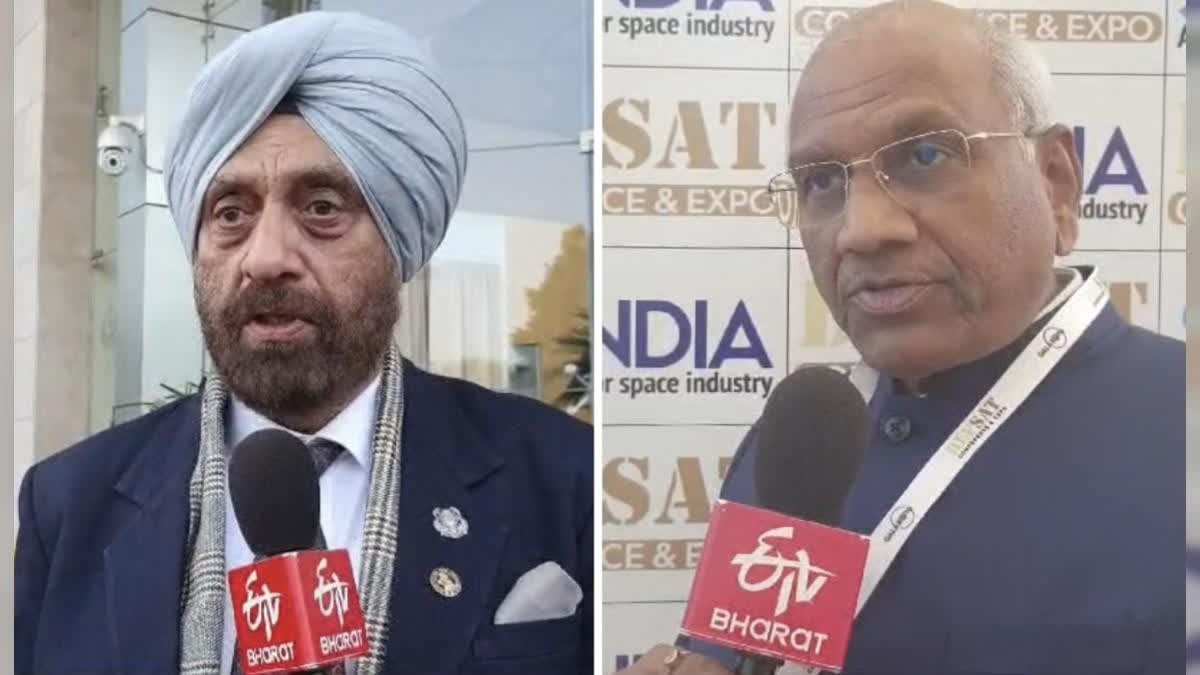By Surabhi Gupta
New Delhi: The DefSat 2025, spotlighted India's drive to integrate space and defence capabilities to address modern security challenges. This year's theme, 'Integrated Space Capabilities for Multi-Domain Operations,' brought together over 500 experts from sectors including government, defence, space, technology, and homeland security. The event highlighted the pivotal role of space technologies in reshaping warfare across land, sea, air, cyberspace, and the homeland security spectrum.
Space: The Fourth Frontier of Warfare
Former Lt. Gen (Retd) (Dr.) PJS Pannu highlighted the dual-use nature of space technology. Speaking to ETV Bharat, he described space as the "fourth frontier of warfare," explaining its critical role in modern military operations.
"Space technology, initially developed for civilian purposes, is a global commons that offers immense potential for military applications. Satellites used for Earth observation can also provide intelligence of military value," he said.
He elaborated on the three key attributes of space technology—ISR, Positioning, Navigation, and Timing (PNT), and advanced communication systems—and their applications in multi-domain operations. "The ISR capability allows us to gather intelligence, analyse it, and prepare for potential threats. PNT systems are essential for precision warfare, particularly for missile systems and hypersonics. Reliable space-based communication ensures seamless long-range connectivity, overcoming ground-level disruptions," he explained.
He also noted how advancements in civilian space technology, such as satellite-based navigation and communication systems, have created dual-use opportunities for defence. "From land and maritime warfare to air and cyber domains, space technology has become a backbone for multi-domain operations. Homeland security also greatly benefits from these advancements," he added.
He also highlighted ISRO's contributions to space research and development, particularly in Earth observation and communication technologies, while stressing the need for greater integration between civilian and military applications.
The Strategic Importance of Space in Defence
Dr. Subba Rao Pavuluri, President of SIA-India and CMD of Ananth Technologies, emphasised the critical need for satellite-based intelligence and surveillance systems to secure India's borders and maritime territories.
Speaking to ETV Bharat, Dr. Pavuluri said, "Satellites are indispensable for both civilian and defence applications. In defence, they serve critical roles in Intelligence, Surveillance, and Reconnaissance (ISR) activities. High-resolution imagery and radar data from satellites enable the gathering of actionable intelligence. This is particularly vital for monitoring challenging neighbours to our north and west and ensuring comprehensive maritime security."
He elaborated on the significance of satellites for monitoring troop movements, analysing scenarios, and preparing for potential challenges. "India's extensive coastline and borders necessitate constant vigilance. ISR capabilities, exclusive military communication satellites, and disaster management tools are essential. The lack of dedicated defence satellites in low Earth orbit and communication orbits highlights the need for indigenous satellite development for military purposes," he added.
Dr. Pavuluri also stressed the importance of building a robust satellite constellation to bolster India’s ISR capabilities and ensure national security. "A strong satellite network not only strengthens our defence infrastructure but also supports disaster management and civilian needs," he noted.
The exposition received strong support from key government entities like the Department of Space, DRDO, NSIL, and the Ministry of Defence.



